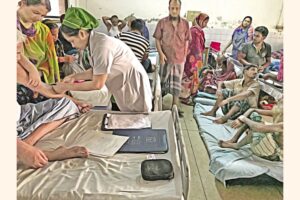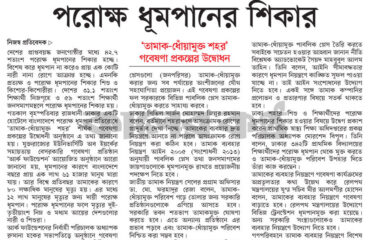The World Health Organisation (WHO) strongly promotes the primary care principles enshrined in the 1978 Alma Ata declaration which emphasises equity, inter-sectoral collaboration, access to essential drugs, appropriate health technology, and comprehensive care. A Primary Health Care (PHC) approach from a services delivery perspective can be characterised as primary care: the continuum of first contact promotive, preventive, diagnostic, curative, rehabilitative and palliative care services delivered across the life-course. It is also important that PHC has close liaison with secondary and tertiary cares in coordinating care across health sectors.
According to WHO European Health Report 2018, in spite of progress made in strengthening PHC, widening inequities and gender differences, especially for non-communicable disease (NCD) outcomes, population ageing, increasing vulnerable groups, quality deficiencies, increased burden of mental illness, the global threat of antimicrobial resistance, and high out-of-pocket payments are critical challenges globally for providing PHC for all. With the 2030 Sustainable Development Goals (SDGs) on the horizon there is renewed drive and political commitment globally for PHC strengthening as an accelerator towards Universal Health Coverage.
Since independence, successive health plans of Bangladesh have emphasised primary healthcare (PHC) as the key approach to improving the health status of the population, particularly the vulnerable groups. However, before the health- sector reforms in 1996/97, the share of the Ministry of Health and Family Welfare (MOHFW) in resources going to primary and tertiary-level care was nearly the same, 38 per cent and 37 per cent of total healthcare expenditure respectively. Under the reforms in 1998, an Essential Service Package (ESP) was designed, with the aim to allocate 60-65 per cent of total healthcare resources to the primary level (upazila and lower level).
The ESP in Bangladesh was planned to be delivered through different levels of the primary healthcare system (community, union, upazila, and district levels). A set of the most cost-effective interventions was selected for the package. Within ESP, government gave the highest priorities to those interventions that have a merit-good character (that is have important externalities), and that were related to maternal and child health. In 1999/00, the proportion of MOHFW expenditure incurred at the upazila and lower-level health facilities to total MOHFW expenditure increased to 62 per cent, while the share to district and upper level declined to only 19 per cent. However, since 2001/02 the healthcare expenditure at upazila and lower levels(i.e. the primary care level), as a proportion to total healthcare expenditure, started to decline, and the MOHFW could not meet the target of channeling 60-65 per cent of healthcare resources to the primary-level facilities. Public Expenditure Review 2015 states that in 2012, 49 per cent of the total healthcare expenditure was incurred at upazila and lower-level facilities, while the proportion has gone down in recent years.
It is, therefore, important to increase investment in primary health services, which would help reduce the burden on secondary and tertiary healthcare.
Non-communicable diseases are a major public-health challenge accounting for 67 per cent of adult deaths in Bangladesh. Studies have found 12 million people, 32 per cent of women and 19 per cent of men, aged 35 years or older having hypertension, while 7 million individuals aged 15 and above having diabetes. The MOHFW while implementing the 4th Health, Population and Nutrition Sector Programme (HPNSP) from 2017-2022 emphasized strengthening PHC to address NCDs. Preventing risk factors, screening for early diagnosis and management at PHC level has been identified as a priority under the 4th health-sector programme. It is recommended that integrated PHC with expansion of ESP and healthcare financing as a crucial component of health systems are vital for achieving universal health coverage (UHC).
Hence, strengthening PHC for providing preventive and promotive care, especially for NCD control, should receive high priority in budgetary allocation. However, the Public Expenditure Review 2015 showed that the proportion of government spending on curative care is increasing over time while that of preventive care is in a declining trend, which needs attention of policymakers. It was evident during the COVID-19 pandemic that allocation under public health, specially for water and sanitation and hygiene programme, is insufficient in the country. Government needs to take the responsibility of these interventions, need to put it in budget and ensure efficient utilisation of the resources.
Primary healthcare in Bangladesh is very diverse — both public and private (not for profit and for profit) sectors provide primary healthcare. A variety of healthcare providers, including “allopathic”, ayurveda, unani, homeopathic, and traditional healers (without any form of training) deliver care. The government needs to put emphasis on regulating the diverse actors in ensuring quality primary healthcare.
Inadequate human resources and retention of health personnel in rural areas are also major challenges. Evidence suggests that improved living and working conditions, better salaries, use of disruptive technology, co-operative arrangements with other rural health facilities, and continued training help the doctors and nurses to provide high-quality care in rural areas. In the absence of adequate training, improvement in living and working conditions, and career progression, merely making it mandatory for nurses and doctors to work in rural areas does not work. Bangladesh needs to develop career path of the doctors and health workforce and ensure other facilities to retain them in the rural areas. In addition, given the shortage of physicians to work in rural areas, many countries have engaged non-physician providers to deliver primary healthcare in rural areas. It is evident that non-physician providers, when well-skilled, supported, and supervised, can deliver good-quality healthcare for a range of conditions. The Ministry of Health and Family Welfare of Bangladesh has sub-assistant community medical officer, community healthcare providers, health assistants and family-welfare assistants to provide preventive and promotive care in rural areas. It is important to ensure that they have adequate skill in providing quality primary healthcare. They should be supported through regular training, incentives, and supervision.
Although urbanisation has been on the run in the nation, urban primary healthcare system remains weak. Providing urban primary healthcare services is the responsibility of the Ministry of Local Government, Rural Development and Cooperatives. However, due to the limited resources of City Corporations (CCs) and Municipalities, primary healthcare facilities and services for the urban population are inadequate and private sector remains the major sources of care. Since the Ministry of Local Government, Rural Development and Cooperatives is also responsible for maintaining transport systems, water, sanitation, planning and development, there is yet to develop a system for accountability in terms of the urban health system.
In addition, the plurality of providers at the primary healthcare level in the urban health system creates heterogeneity in service delivery with diverse service coverage, quality of care, and service fee. According to the National Urban Health Strategy 2020, rapid influx of the rural population into the cities in search of employment opportunities and a better lifestyle has made the challenges in delivering quality urban healthcare services more complex. It is crucial to strengthen primary healthcare services focusing on the vulnerable group of urban population, and the government needs to invest in improving urban primary healthcare system.
Out-of-pocket health expenditure is high in Bangladesh — 74 per cent of current health expenditure — and most of this is spent on outpatient treatment, mainly medicines and diagnostic tests. Healthcare expenditure is a common reason for families to be forced into poverty. In the absence of structured referral pathways, people can seek care from tertiary level bypassing the primary care, which increases the healthcare expenditure manifold.
Purchase of medicines including antibiotics over the counter without prescription is another challenge which poses the serious threat of antibiotic resistance. The World Bank report 2018 estimated that low-income countries could lose more than 5.0 per cent of their Gross Domestic Product in a high-impact scenario if antibiotics and other antimicrobial drugs lose their effectiveness due to inappropriate use of antibiotics. Measures should be taken for appropriate drug dispensing, including training of pharmacists and regulation.
The WHO also places great emphasis on local community involvement, delivering care locally, without requiring people to travel long distances, patient-centred care, good local governance, and empowerment of people to take responsibility for their own health. There is no “one-size-fits-all” type of methodology for delivering primary care. However, local ownerships are common features of successful PHC models. Bangladesh should also strive to engage community in strengthening PHC.
Dr Rumana Huque is a Professor of Economics, the University of Dhaka, and Executive Director,
ARK Foundation, Bangladesh.
rumanah14@yahoo.com
Originally published in The Financial Express




